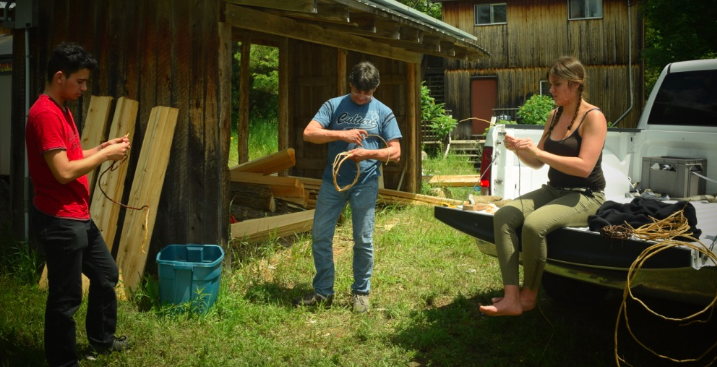|
Beginning in the early 1960's, the Dryden Chemical Company discharged chemical waste into the Wabigoon-English River system, upstream from Grassy Narrows First Nation. The chemical waste contained mercury, and was the byproduct of a process used to create the chemicals necessary to bleach paper. It is estimated that 9000 kilograms of mercury were dumped into the river between 1962 and 1970, when the mercury contamination was discovered. Upon discovery of the mercury contamination, the Ontario government ordered the Dryden Chemical Company to stop discharging waste containing mercury into the river system, but did not regulate airborne mercury emissions.
0 Comments
In 2009, we began a 4-year project entitled Our Traditions Our Future (OTOF). OTOF was an Algonquin/Ojibwe education, hands on training and support project. The project aimed to increase Indigenous capacity to revitalize cultural practices, traditions, and teachings, and to create works of art. These cultural practices included regalia, drum-making, birch bark canoe building, and more. Along with the cultural trainers who taught Indigenous community members, Elders came to Plenty Canada to talk about the 7 sacred teachings, and to conduct ceremonies on a regular basis. OTOF helped approximately 500 families in Algonquin and Ojibwe communities reclaim or improve traditional skills, and access low-cost technology for traditional resource development. Plenty Canada continued the OTOF program through partnerships with conservation authorities, the Canadian Roots Algonquin Exchange Program, First Nations, local youth groups, and more. The need to expand our reconciliation element occurred with the release of the TRC Calls To Action in June of 2016. Recently, we partnered with the Lanark County Neighbours for Truth and Reconciliation by hosting a series of birch bark canoe building workshops. Through the pipe and big drum ceremonies, we facilitated a discussion about our shared understandings and vision for reconciliation. Storytelling and hands on cultural sharing has ignited an increase of public interest. Requests for our projects have accelerated within mainstream and Indigenous communities alike. Consequently, we have increased our focus on reconciliation discussion, while continuing to prioritize Indigenous capacity building.
|
|
-
Home
- Donate
-
Projects
-
Canada
>
- Plenty Canada CampUs
- The Healing Places
- Two-Eyed Seeing Bird Knowledge
- Niagara Escarpment Biosphere Network
- Greenbelt Indigenous Botanical Survey
- Great Niagara Escarpment Indigenous Cultural Map
- Ginawaydaganuc Indigenous Food Sovereignty
- Indigenous Languages and Cultures Programs >
- Wild Rice
- Good Mind Grappling (partnership)
- Ginawaydaganuc Village (partnership)
- Youth Programming >
- Americas >
- Africa >
-
Canada
>
- News
- Resources
- Partners
- Contact Us
Our Location266 Plenty Lane Lanark, Ontario Canada K0G 1K0 (613) 278-2215 |
Donate to
|
Subscribe to our Newsletter |

